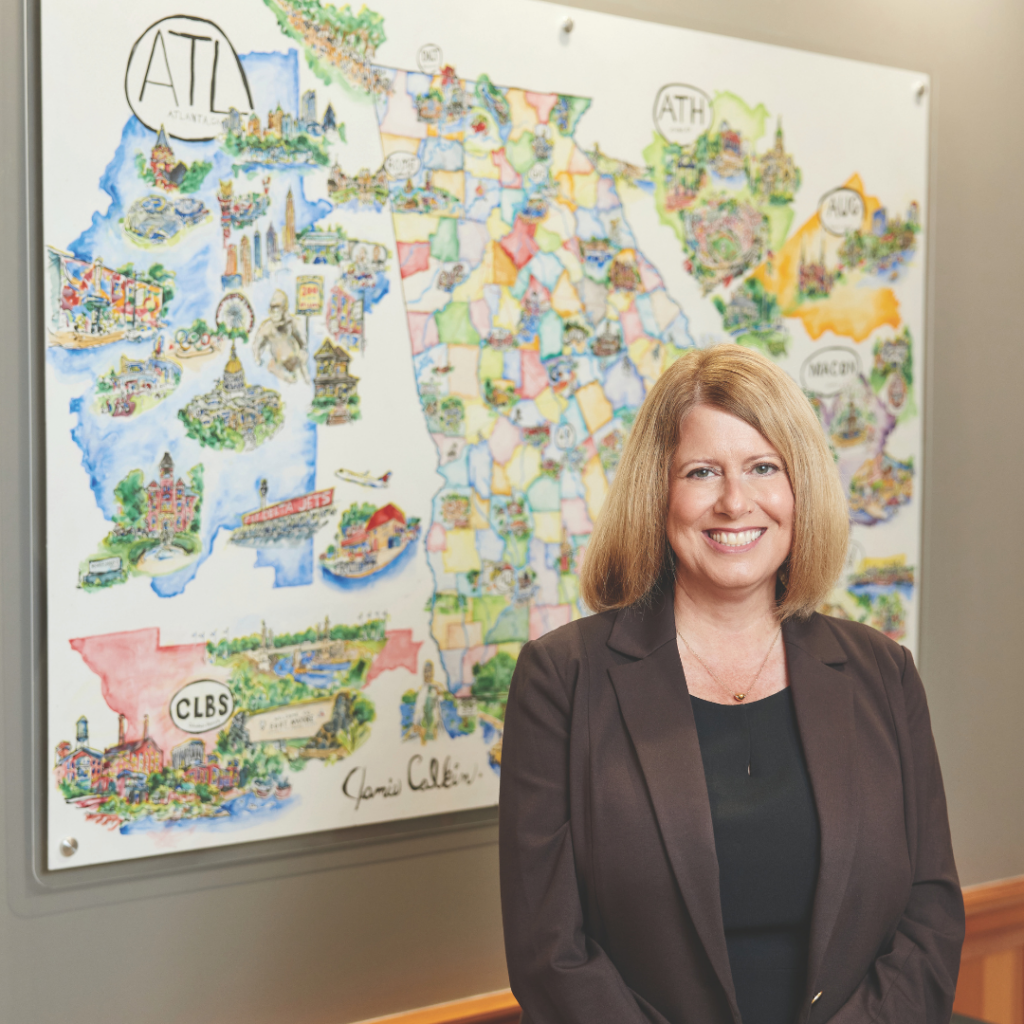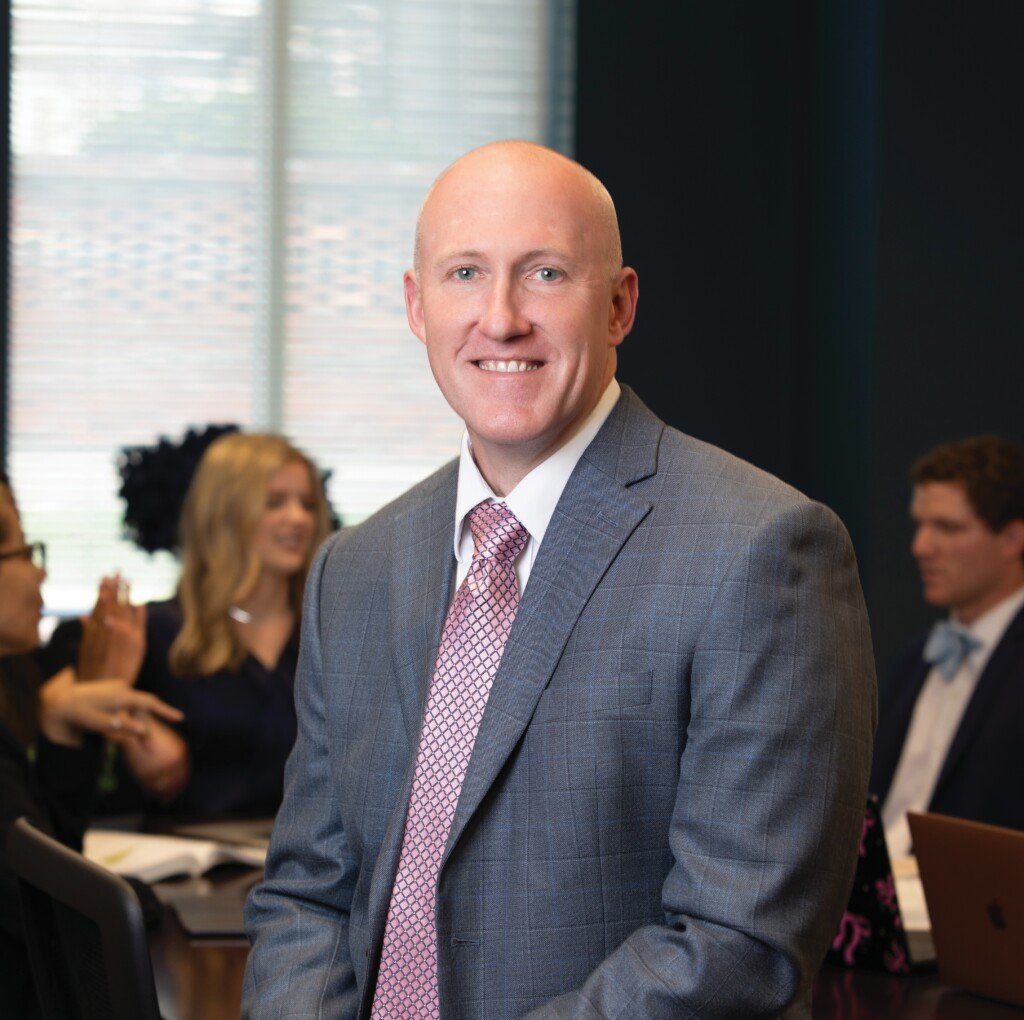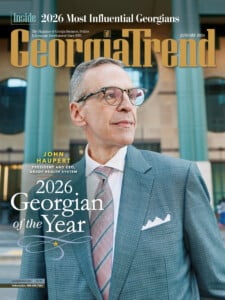Georgia MBA Programs: Pushing Forward
Georgia MBA Programs Offer what Professionals Need to Maximize their Career Success

Program of Leadership: Stephen Craft, dean of Oglethorpe University’s Hammack School of Business. Photo credit: Daemon Baizan
Extra letters after a name are never a bad thing. And getting a Master of Business Administration can be a strategic next step in furthering a career by learning new management skills, no matter the field or industry. “Without question, the MBA is the program of leadership,” says Stephen Craft, dean of Oglethorpe University’s Hammack School of Business. “So if you want to be an entrepreneur, you want to be a corporate leader, you want to be someone who demonstrates your seriousness in your career and your job market, your best bet would be to invest in your human capital through an MBA.”
Yet work itself often gets in the way when someone wants to move their career to a higher level. A program that allows flexibility – whether in when classes are offered or how – can make a big difference. To help professionals and executives around Georgia take that leap in a way that’s right for them – whether based on time, added benefits or interests – universities across the state are tweaking their MBA offerings to further entice potential students.
Many MBA programs today are part-time models designed for working professionals. Many are structured for self-pacing, allowing students to choose their course load throughout the program (with many opting to take full loads for faster completion), and most incorporate some type of online component for extra convenience.
Just two years into its MBA program, Oglethorpe University in Atlanta is taking a unique approach to hybrid instruction through what it calls a “login/drop in” format. “Classes meet live and in person in the classroom, and students can come and sit in that classroom and participate,” says Craft, “but they’re also simulcast, so they can participate from anywhere they have broadband access.” And students don’t have to stick with one format or the other. One day they may want some face-to-face interaction and another they may need to attend online due to travel or other obligations.
The program also offers a unique way for students to catch up if they did not take any prior business-related courses. MBA Bootcamp is a self-paced online experience; the non-credit orientation is held before classes begin. Its goal is “to give a student the language of business,” says Craft. As such, it’s a requirement for students coming in without business-related coursework, but it’s an optional refresher for those who have previous schooling in business-related classes.
For optimum flexibility, it’s possible to get virtual-only access to an MBA education through WebMBA, which offers students the benefits of state institutions working collectively. The online program, which has been named a “best buy” by GetEducated.com, is jointly run by seven University System of Georgia universities (more specifically, their colleges of business): Augusta University, Columbus State University, Georgia College & State University, Georgia Southern University, Kennesaw State University, University of West Georgia and Valdosta State University. Program graduates receive a degree from their choice of any one of the seven schools.

Shared Resources: Allen Amason, lead dean of WebMBA and dean of the Parker College of Business at Georgia Southern University. Photo credit: Frank Fortune
“The idea was simply this: Let’s offer our programs as if we were doing it on our own, but let’s share resources,” says Allen Amason, lead dean of WebMBA and dean of the Parker College of Business at Georgia Southern University. And that initial plan has given WebMBA some definite pluses. “We can make sure every class has a top-shelf MBA instructor,” says Amason, and he estimates WebMBA has about 400 faculty to choose from across its participating schools. “We can make sure every class is full. We can make sure every class is heterogeneous in terms of industry experience and various other types of expertise that we’re trying to pair people together on so that we get that cross-functional experience.” He also says it creates an online experience that’s as similar to a traditional model as possible, and it includes a mandatory two-day, in-person orientation for students to get familiar with each other.
Beyond the Basics
MBA students typically have already received much of the required base “technical” content from undergraduate programs and on the job. “Now [graduate students] are looking to accelerate up the employment ladder,” says Amason. “[In an MBA program,] they’re learning [how to apply] these [skills] that they’ve already been practicing in the market or that they learned in school. And so what they’re really looking for more is an integrated curriculum of those [capabilities] with soft skills. It’s not just about communication. It’s not just about teamwork, but it’s about doing all of those things [to address] business challenges.”
Mark Thompson, dean of Augusta University’s James M. Hull College of Business, says the Hull program provides a base toolkit of business knowledge and skills but also elevates professional development, so students are ready to advance their careers when they graduate. Part of that process is having students work with other students of various educational backgrounds, work experiences and industries.

Elevating Professional Development: Mark Thompson, dean of Augusta University’s James M. Hull College of Business. Photo credit: Hillary Kay
“What they find is [that] a simple topic has so many different parallels, so many different avenues that can be approached, yet they find a lot of commonalities. … ‘We’re in different industries, but we still have to deal with that [same] HR issue or that financial issue,’” he says. “So, it really enriches that entire discussion.” Hull’s programs also promote meaningful discussions about ethical decision-making and skills such as networking and finding mentors, which aid in students taking on future leadership roles.
“If you want to be an entrepreneur, you want to be a corporate leader, you want to be someone who demonstrates your seriousness in your career and your job market, your best bet would be to invest in your human capital through an MBA.” – Stephen Craft, dean, Hammack School of Business at Oglethorpe University
Soft skills are a vital piece of the MBA mix, and the wholly online WebMBA also addresses them – even though students can’t directly interact as they can in a classroom. “A soft-skill program that is fully online is kind of a contradiction in terms,” says Amason. “I like saying we’re focusing on extroversion to a group of introverts. How we do it is we build some structures, one of which is a team structure.”
Students are first put into cohorts that schedule all their classes together; then each cohort is broken into teams of four or five. When teamwork is emphasized in a class, those preset teams work together. And those teams are built purposefully.
“We pay someone to actually build those [teams, using] some psychological modeling and some experience tracking to build a heterogeneous group of experiences and personality types,” Amason says. “So, they have to work with different people to leverage different skill sets to solve problems.” This sets them up for confronting real-world personalities and business issues, maximizing the experience as much as possible given the online format.
At Oglethorpe, the teaching style focuses on building soft skills such as critical thinking and communication. “In our MBA program and our undergraduate program, you’re going to be up, you’re going to be engaged,” Craft says. “You’re going to be presenting. You’re going to be writing papers. There are a lot of MBA programs you could go through and probably never get asked to write a paper. … Nothing [where] you really have to stretch yourself.” The small class sizes at Oglethorpe (around 25 students each) are key to making this approach possible – and successful, whether it’s with papers or presentations. “The faculty member really has time to spend with each student, to listen to their presentations, give them feedback and, if necessary, have them redo it if they think that really there’s room for improvement,” he says.
Concentrated Focus

Addressing Challenges: Renee Bourbeau, executive director of MBA programs for the Michael J. Coles College of Business at Kennesaw State University. Photo credit: Daemon Baizan
Some MBA programs offer concentrations for further advancement in specific content areas. Kennesaw State University and Augusta University are each tailoring options that fit their schools and the state.
Rural communities, especially in Georgia, are growing rapidly – as are their needs, and Kennesaw State knows the importance of qualified professionals for rural interests. Starting in fall 2025, it will offer a rural management concentration within its evening MBA program, which will be the first such program offered in the United States.
Renee Bourbeau, executive director of MBA programs for Kennesaw State’s Michael J. Coles College of Business, says that Georgia is the perfect state to launch this MBA concentration because it is home to two of the country’s fastest-growing counties (Jackson and Dawson) and seven top-performing rural areas, according to Site Selection magazine. This, and her own experience as a resident of rural Jasper and the granddaughter of a farmer, gave Bourbeau the idea for this concentration. She knows that population growth can bring new challenges to rural communities. “We want to see rural Georgia prosper … and it’s also part of our mission to educate the community and to be accessible for the communities that we serve,” she says. “So, we see this [concentration] as a way to really do that.”
Bourbeau emphasizes that high-paying jobs do exist in rural communities, yet companies are having trouble finding qualified people to fill the roles. She expects degree-related roles to cover private and public sectors, offering a wide range of high-paying options, anything from director of accounting to logistics manager to elected official. “This type of degree could really prepare someone for that kind of career,” she says, “and the competition is not as great for those roles, just to be straightforward about it.”
Augusta University’s Hull College of Business offers a concentration in healthcare management, which speaks to the university’s health sciences core. “Part of that really tailors to a lot of our healthcare professionals and executives here in Augusta,” says Thompson. “It also tailors to our joint MD-MBA students and our joint DMDs or dental students. … We also get a good number of existing doctors and dentists, along with just other practicing physicians of a variety of sorts, that are interested in the MBA. And so having that concentration really matches well and aligns well.”
“You’re not just paying money and getting title to something. You’re [putting in] some money, you’re spending some time, you’re investing some sweat along the way, but it’s an investment. And what you have bought is something you’ll hold forever.” – Allen Amason, lead dean of WebMBA and dean, Parker College of Business at Georgia Southern University
Thompson highlights the public exposure that the concentration brings to the university. “As a business school, we can talk a lot about business programs, and how that’s valuable for the healthcare field, but when you can turn around and have a dedicated healthcare-oriented degree, it’s now one more piece of the portfolio for Augusta University,” he says.
The Value of Investment

Integrated Curriculum: Allen Amason, lead dean at WebMBA, at an MBA networking social at Georgia Southern, where he is dean of the Parker College of Business. Photo credit: Contributed
All of these aspects – flexibility, soft-skill development and specialty options – can offset concerns about challenges such as time and money when determining whether to go for an MBA. “What we want people to appreciate is that getting a degree is like buying a share of stock; it’s like buying a piece of property,” says Amason. “You’re making an investment. The investment is in a different form. You’re not just paying money and getting title to something. You’re [putting in] some money, you’re spending some time, you’re investing some sweat along the way, but it’s an investment. And what you have bought is something you’ll hold forever.”
And from that investment, Thompson hopes students see that added value on both professional and personal levels. “Oftentimes, we get students that come in knowing that completing the MBA leads to a promotion,” he says. “When I can then hear from those students how it’s helped them with work/life balance because they now know how to better manage their space, their operations, whatever it may be, that, to me, is a fulfilling piece.”











